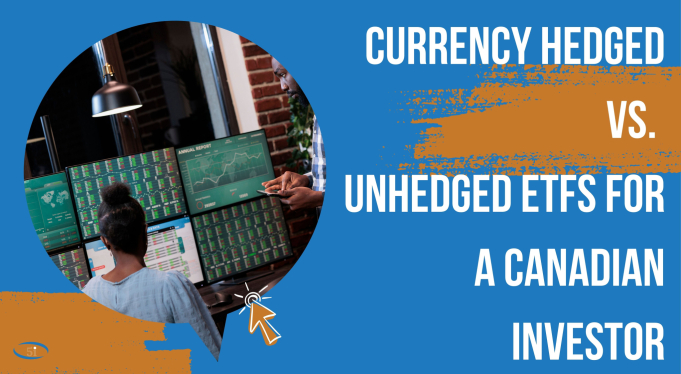For many investors, ETFs serve as one of the most efficient investment vehicles offering flexibility and broad market exposure. The market for ETF products has seen significant growth over the previous few years, and now there are numerous options and styles available. However, for Canadian investors, products denominated in Canadian Dollars can be more limiting in certain strategies/investment styles compared to US Dollar denominated funds. One workaround that asset managers have been utilizing to combat this problem is by offering CAD hedged versions of their ETFs denominated in USD. We will further explore how a CAD hedged ETF works and the implications.
Unhedged vs CAD Hedged
To understand the mechanics of hedged ETFs we have to first understand the purpose behind hedging. If a Canadian investor wants to invest in a US or foreign ETF, for example a 100% US based basket of equities, the individual investments will have to be made in USD or the given foreign currency. What this typically looks like is if an ETF trades in CAD but the underlying holdings are all in USD. When the investor purchases the ETF, the brokerage who is executing the transaction will convert the CAD to USD at the exchange rate. The holdings are held in USD and assets are not converted to CAD unless the investor sells their shares. When shares are sold, the brokerage converts the USD proceeds back to CAD at the new prevailing exchange rate. Dividends also factor in with the same mechanism for conversion being used since the payments will likely be in USD.
The risk that is presented with an unhedged ETF is that the price movement of the underlying holdings is not the only factor affecting returns, it is also the exchange rate. Currency risk is present due to the conversion at the prevailing exchange rate. For example, if the CAD appreciates relative to the USD, then the USD holdings will be worth less, and investors could face an additional loss on sale. This can also work in the investors favour if CAD were to depreciate to the USD, then the USD holdings will provide an additional gain on sale.
To offset this risk, asset managers have used hedging strategies so the only factor at play that investors need to worry about is the underlying holdings. Hedged ETFs typically involves utilizing forward contracts to mitigate currency fluctuations by locking in an exchange rate. Continuing the previous example but with a CAD hedged ETF, the use of forward contracts or other financial instruments will convert USD returns to CAD at a fixed price, eliminating the currency risk. One other aspect here is that due to the use of forward contracts, hedged ETFs typically charge higher expense ratios to compensate for the higher trading costs.
Unlock the Power of Informed Investing with 5i Research!
DIY investing doesn't have to mean going it alone. At 5i Research, we're your trusted partner in navigating the stock market. Our platform offers comprehensive stock and market research, empowering you to make smart investment decisions.
- Investor Q&A: Have burning questions? Get answers from our team of experts and fellow investors in our dedicated Q&A section.
- Research Reports: With over 60 meticulously researched Canadian stocks, our reports offer in-depth analysis, giving you the confidence to invest wisely.
- Model Portfolios, Alerts, Forums, Portfolio Tracking, and Much More...
Takeaway
While there are pros and cons of both options, we think that if investors have the choice, unhedged ETFs are typically the better choice. The higher expenses of hedged ETFs can eat into returns, potentially more than the currency fluctuation. While this is not always the case, some of the largest S&P 500 funds offering both unhedged and hedged options display this phenomenon with the unhedged outperforming (VFV vs. VSP and XUS vs. XSP). Additionally, the potential for added returns is still attractive, especially from a Canadian investor investing in USD. While there is likely more volatility in an unhedged investment, we view this as an inherent risk of wanting exposure to foreign markets. Overall, we are not entirely against hedged ETFs but the added layer of protection they provide may not be a necessity for most investors and if there is an option, we would choose unhedged.
Take Care,






Comments
Login to post a comment.